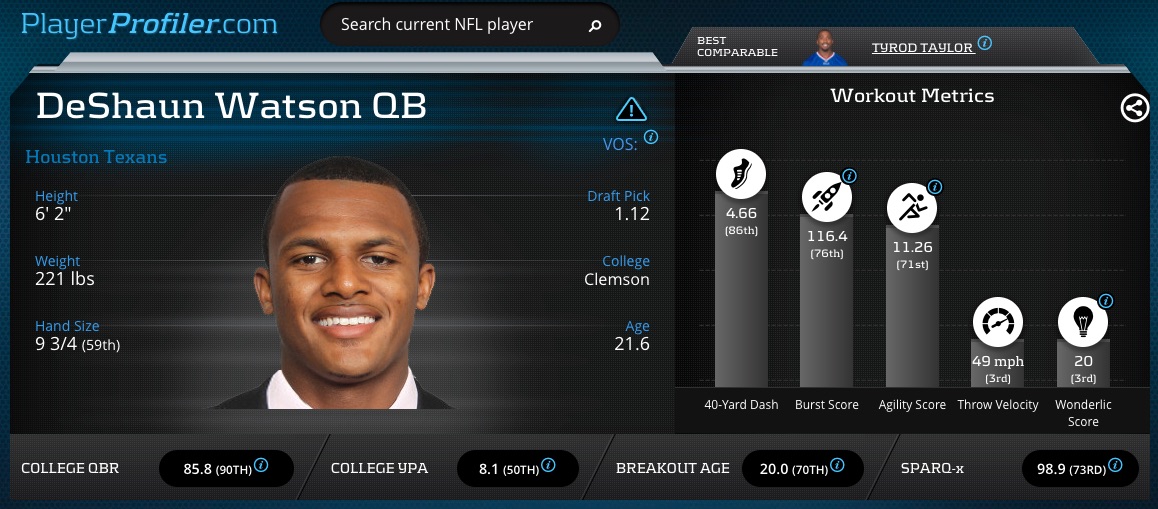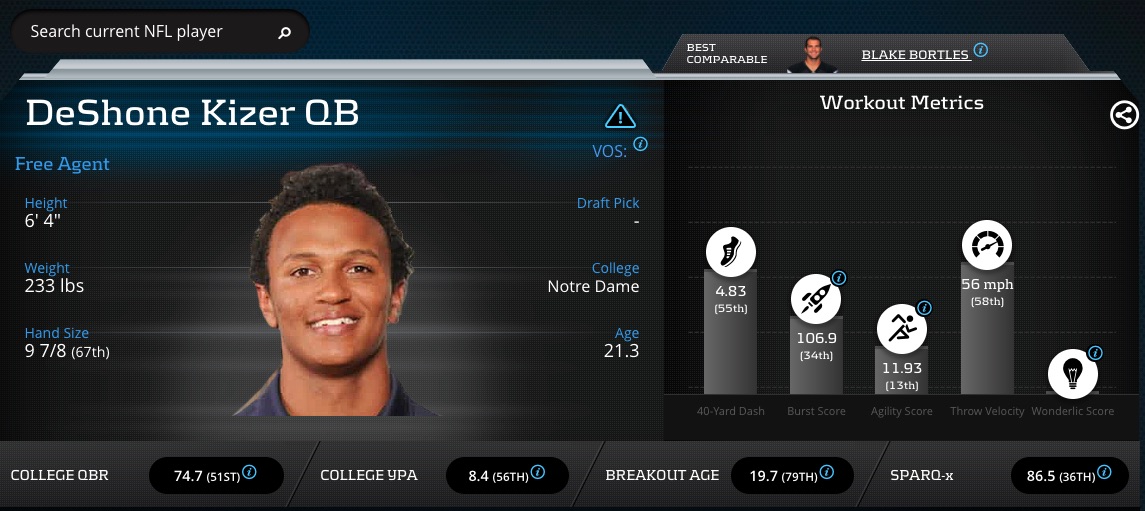Unlike dynasty football leagues, the re-draft environment has a much less enthusiastic outlook on rookies. They are largely characterized as low use assets who are akin to a lottery ticket. While each position has different hit rates, depending on your barometer of success, generally these players will be low investment with the potential for good returns (read: starter).
What this series will investigate is how each position has historically performed in their rookie seasons, since 2000. Additionally, it will take a look at the 2017 draft class to determine who fits the success archetypes with the greatest chance of early results. Hopefully, this will provide information on how to approach rookies in 2017 and beyond.
NFL Draft History (2000-2016)
Before we dive into results, we should take a brief look at how the NFL draft tends to shake out for the quarterback position. As expected, it resembles a dumbbell. Take a look at the chart below to see the average outcome for quarterbacks in the NFL draft by round.
Like I mentioned before, the tail ends of the draft see the largest quantity of quarterbacks selected. In these 17 drafts, a quarterback was selected first overall on 12 occasions. Three additional instances occurred where the second overall pick was a quarterback, each one a result of a different quarterback selected first. In total, 213 quarterbacks were selected with many more undrafted signal callers who caught onto rosters.
The Long Con(tribution)
Ideally, owners would love to own a player and have him become a season-long contributor. For that player to be a rookie, unlike dynasty or keeper leagues, makes no difference. At the end of the year, all that matters is a championship. Next year, you will just draft a new team that may or may not feature any of your players from last year.
The stigma with rookie quarterbacks is that very few can contribute at a startable level for their rookie season. That is largely true, only six rookies since 2000 have managed to finish in the top 12 at the position. Here is the full list:
2006: Vince Young (finished No. 10)
2011: Cam Newton (No. 4)
2012: Andrew Luck (No. 10), Robert Griffin III (No. 6), Russell Wilson (No. 11)
2016: Dak Prescott (No 9)
The easiest pattern to see here is that all of their passing was buoyed by rushing fantasy points. Everyone but Russell Wilson had at least five rushing touchdowns and even he ran for nearly 500 yards and four touchdowns. Of the players on this list, only Luck’s rushing output would be a little surprising. It is, though, important to note how much rushing ability can add to a rookie’s value.
As you venture into fantasy QB2 territory (top-24), less mobile quarterbacks start to emerge. On the high end we have players like Matt Ryan, Andy Dalton, and Jameis Winston finish in the top 18. In the low fantasy QB2 territory, there are 14 more signal callers, 11 of which were first round NFL draft picks. That list does include both Carr brothers, for those of you interested.
Overall, there were 172 rookie quarterbacks who scored fantasy points between 2000 and 2016. Of those, 23 (13.3-percent) finished at a fantasy QB2 level or higher (5.2-percent finished at the fantasy QB1 level). Only six of the 23 were drafted outside the first round and only two (Prescott and Chris Weinke) were outside the top 100 draft picks.
Another note, the overall increase in team passing statistics means the threshold to reach these QB1 or QB2 milestones are higher. Take, for example, Matt Leinart in 2006 who scored 142 fantasy points. That was good enough for a finish of 23rd at the position. In 2016, Carson Wentz scored 247 fantasy points, good enough for 22nd.
While seasonal performance is good to know, we really need to dig deeper here and understand the more nuanced numbers that occur on a weekly basis.
The Short Con(tribution)
Most leagues have a fair amount of quarterback talent who lives primarily on the waiver wire. This has spawned the late round quarterback theory and the prime reason an owner is capable of streaming options at the position on a weekly basis. Most rookie quarterbacks will not be drafted, meaning that they can be prime options for those who are looking for a short-term solution.
There were 987 total instances of a rookie quarterback scoring fantasy points, which makes up nearly 10% of the total weekly quarterback performances during this timeframe. Of those, there are 194 weeks of top 12 performances by rookies, including 73 within the top 6. Unsurprisingly, the six quarterbacks we mentioned earlier also populated this list pretty extensively. Here’s a list of the quarterbacks with at least three weeks of top-6 fantasy QB finishes:
2000: Aaron Brooks (3)
2006: Vince Young (3)
2010: Tim Tebow (3)
2011: Cam Newton (9)
2012: Andrew Luck (4), Robert Griffin III (6), Russell Wilson (4)
2013: Geno Smith (3)
2015: Marcus Mariota (3)
2016: Dak Prescott (3)
Much like the year-long standouts, the weekly names are also players who largely have scrambling ability. This again speaks to the idea of what rushing ability adds to nascent passers. When you start adding in lower top 12 weeks, players like Matt Ryan, Joe Flacco, Ben Roethlisberger, Teddy Bridgewater, and Jameis Winston are frequent members of the club. They are more traditional passers, and more polished based on their draft pedigree and college backgrounds.
Fantasy QB2 weekly finishes comes down simply to opportunity. 99 different quarterbacks combined for just over 300 QB2 level finishes. Of those 99 quarterbacks, 17 were undrafted rookies, just one less than the 5th, 6th, and 7th round quarterbacks combined. This points towards opportunity over talent in regards to a top 24 finishing week.
Similar to what we spoke about regarding the threshold changing at the annual level, it changes at the weekly level too. Here’s a sample comparison of rookies who barely qualified for fantasy QB2 status for a weekly finish in 2000 vs 2016.
In week 10 of 2016, Cody Kessler managed 7.94 fantasy points. That was good for a finish at 27th for the position. This increased threshold makes it harder for rookies to be a QB2 on a weekly basis, much less crack the top 12.
Who Could Help Early
Let’s be honest here, this is not a good rookie quarterback class. Yes, three of them went in the first round, but in this depressed draft, it’s hard to be enthusiastic. That makes the outlook of this position rather dull. Even still, I do believe there are a few quarterbacks with a chance to provide value early given the right opportunity.
More Likely to Help
Joshua Dobbs, QB, Pittsburgh Steelers
I believe Joshua Dobbs represents the highest ceiling among all rookie signal callers. He was a good runner in college and is now attached to a top offense. Add in a fragile quarterback in front of him and Dobbs could easily provide multiple QB1 weeks if/when Ben Roethlisberger goes down. Dobbs could be a 30-50 rushing yard per game quarterback in addition to his passing numbers, which would inevitably be buoyed by the consistency of Antonio Brown and the big play ability of Martavis Bryant (among others).
DeShaun Watson, QB, Houston Texans
I worry about DeShaun Watson as a long-term passer but he has the profile of a short-term asset. He can run the ball well and has the weapons to mask some of his deficiencies (read: 49 MPH throw velocity). The first round selection means he will likely get the starting role and could easily finish the season as a QB2 with several QB1 weeks mixed in. If you subscribe to the late quarterback ideology, Watson is the type of pickup who could drive key weeks.

Patrick Mahomes, QB, Kansas City Chiefs
Patrick Mahomes, much like Joshua Dobbs, has a blocked path to relevance. Unlike Dobbs, his quarterback is not nearly as entrenched. Mahomes has the draft pedigree and that ability to gain yardage with his legs. Add in a strong arm and an emerging offense and we could see some spot starts down the stretch for the rookie. If that’s the case, you could see more than the 200 or so passing yards Alex Smith is prone to produce.
https://www.youtube.com/watch?v=ivpIymGQj9U
Jerod Evans, QB, Philadelphia Eagles
Given some past success with undrafted quarterbacks, Jerod Evans deserves a highlight. He goes to the Eagles where they are pass heavy and their starter had a middling season at best. Evans is a dangerous running quarterback and showed accuracy at times and a penchant for the deep pass. If he starts, there is serious upside to Evans’ fantasy game, especially with the Eagles receiving options.
Check out DeShaun Watson and Patrick Mahomes on the Updated PlayerProfiler Dynasty Rankings:
Less Likely to Help
Mitchell Trubisky, QB, Chicago Bears
The first quarterback drafted is in the toughest situation. While elusive, Mitchell Trubisky is not likely going to scramble for too many yards. Add in a below average wide receiver corps and a running back who is a limited pass catcher, and Trubisky is more likely to have a Cody Kessler rookie year than a Dak Prescott one. Expect a few QB2 weeks but the ceiling is low in year one.
https://www.youtube.com/watch?v=qYWVyM_jvFA
DeShone Kizer, QB, Cleveland Browns
I’m not sold on DeShone Kizer as an NFL quarterback and while he was willing to scramble, he’s a below average athlete for the position. An erratic passer already, Kizer could struggle to beat out Cody Kessler. There is upside on this offense, I’m just not convinced Kizer is capable of growing this team as quickly as other options on the team.

C.J. Beathard, QB, San Francisco 49ers
A surprise pick in the third round, C.J. Beathard walks into an interesting situation. Brian Hoyer is the starter but is a fragile one at best. The team is lacking weapons but a new coach and a need to pass frequently could help here. Beathard is a pure pocket passer, which will limit his upside if he does start early.
Davis Webb, QB, New York Giants
Eli Manning is not the type to miss a game. As a result, Davis Webb is likely riding the bench. The pocket passer has limited mobility and worked in an offense predicated on quick, short passes. None of this bodes well even if he does get some playing time in 2017.







